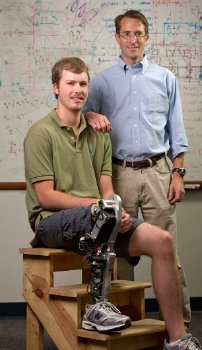At Vanderbilt University in Nashville scientists are working on a lower limb prosthetic that will allow amputees to walk with a more natural gait. The artificial leg which they have come up with uses computing, sensor, electric motor and battery technology to achieve its purpose.
 Professor Michael Goldfarb, right, with amputee Craig Hutto who is wearing the new bionic leg developed at Vanderbilt. (John Russell, Vanderbilt University)
Professor Michael Goldfarb, right, with amputee Craig Hutto who is wearing the new bionic leg developed at Vanderbilt. (John Russell, Vanderbilt University)
As per the team it is the first with powered knee and ankle joints that operate in unison. It was developed by Michael Goldfarb, the H. Fort Flowers Professor of Mechanical Engineering at the Vanderbilt Center for Intelligent Mechatronics.
Goldfarb said that the research had been in progress over the last seven years. With their latest model, they had validated their hypothesis that the right technology was available to make a lower-limb prosthetic with powered knee and ankle joints., Goldfarb added that their device illustrated the progress they were making at integrating man and machine.
A 23 year old amputee who has been testing the leg, Craig Hutto, said that when it was working it was totally different from his current prosthetic. The passive leg was always a step behind him, but the Vanderbilt leg is just a split second behind.
Hutto said that going up and down slopes was one of the hardest things to do with a conventional leg so he had to be conscious of where he went because he could get very tired walking up and down slopes. But that won't be a problem with the powered leg because it goes up and down slopes almost like a natural leg.
The Vanderbilt leg is designed for daily use in regular life. It makes it much easier for the amputee to perform functions such as walking, sitting, standing and going up or down staircases. The device also showed that it was 25 % faster than walking with a regular passive leg on a level surface.